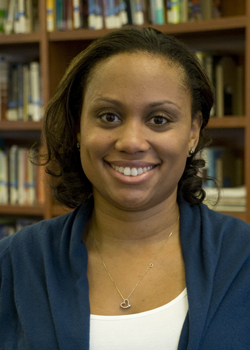Filed Under > Convocation
Education Policy Grounded in Research
T. Nicole Washington wants to translate research for educators and policymakers.
T. Nicole Washington, who received her master’s degree in Comparative and International Education with a focus on policy, did not find her calling in education policy as much as it found her. The Akron, Ohio native came to Teachers College in 2009 straight from a teaching fellowship in Thailand, intending to explore and compare education practices around the world. But after working with professors George Bond, Lesley Bartlett and Lynn Kagan at TC, Washington settled on education policy in the United States as her focus and career.
Washington’s interest in education started after her sophomore year at Princeton, when she took a summer position teaching seventh- and eighth-graders for the Summerbridge program in Atlanta (now the Breakthrough Atlanta program). With no training or experience, Washington and her ambitious cohorts were given the broad outlines of a curriculum, but they had to write their own lesson plans. “It was extremely rigorous,” Washington, now 29, recalls. But she had fallen in love with education, never to look back.
Since then, she has taught in the Bronx as a New York City Teaching Fellow, at a charter school in Miami, and abroad in Chiang Mai, Thailand. For her junior-year independent work at Princeton, she went to New Zealand to explore that country’s education system. In all four places, she uncovered inequity in the schools, and she determined that closing gaps in learning opportunities would be her life’s work. At The Prince Royal’s College (for grades K through 12) in Chiang Mai, she helped develop an accelerated English learning program and helped revamp the local English-teaching program.
At TC, Washington worked part-time for the Consortium for Policy Research in Education (CPRE). For her master’s thesis, “What Were They Thinking? An Exploration of the Connecticut Commission’s Education Reform Strategy,” she worked with the Governor of Connecticut’s Commission on Educational Achievement, examining the state’s education system from a business perspective.
“The Commission was focused on efficiency, on making education more streamlined and accountable; on transparency; and on higher standards for teachers,” she says. “I looked at how business leaders are informing education, making education decisions, [and] what tools they use to do research.” That experience taught her the importance of connecting education research to budget and policy decisions.
“Educators and academics need to be better advocates for research,” Washington says. “You can bring people the research, but not everybody will listen. Education professionals would be naive to assume that research stands on its own merits, or that people making education decisions actively seek out professional research to support their agendas.”
This spring and summer, Washington is working as an intern on education issues in Florida, in the office of Lieutenant Governor Jennifer Carroll, and in the Governor’s Office of Policy and Budget. Carroll’s boss, Governor Rick Scott, has pushed for sweeping changes to Florida’s school system, including private school vouchers and merit pay for teachers. These are popular with some, but have been excoriated by others, including the state’s teachers union and educators across the country. While watching the Florida state legislature and the governor’s office debate Scott’s education reform policies, Washington learned the value of compromise and discretion, two vital components of successful policy work. Without both, Washington discovered, change never comes.
“You get to see democracy in action. It’s here; it’s salient,” she says. “It’s government, politics – people – hashing it out what [they] believe, trying to find common ground.”
That interest in mediation, and a commitment to policy grounded in research, will direct Washington’s work. While she may pursue a doctoral degree some day, she wants a job now where she can help connect educators and policymakers with the research and data they need to make good decisions in schools and classrooms.
“There are people out there making education decisions every day,” she says, “and if [academics] are not a part of that, then we’re not putting ourselves in a position to be helpful in the way we should.”
Published Tuesday, May. 24, 2011
